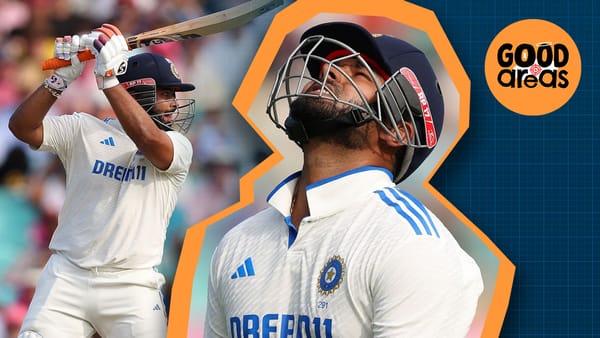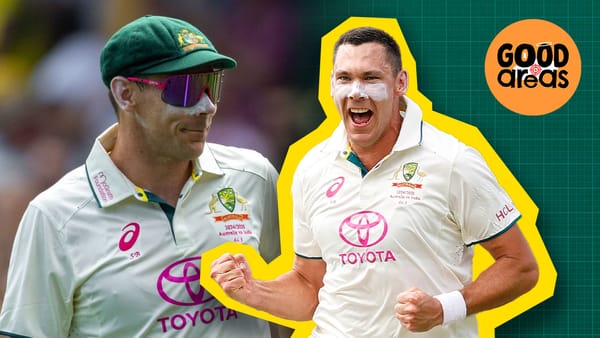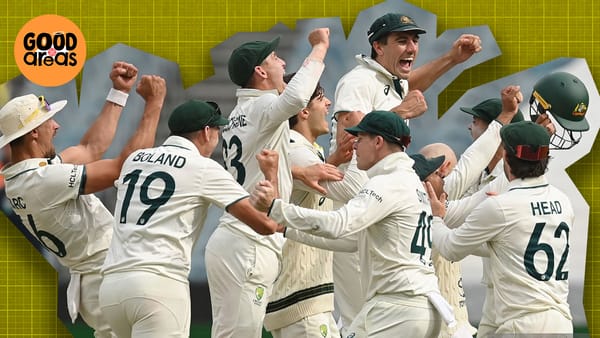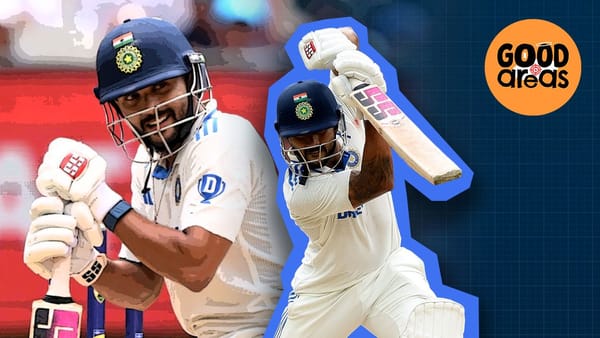It's in the blood
Learning about drugs in sport
Working in cricket, I feel like I've never looked much into drugs in sport. It's not that cricket hasn't been touched, but you are shaped by the sport you cover. If I wrote about cycling or athletics, I'd be all over these topics. But I write about cricket, so I'm an expert in corruption, corporate governance and tea breaks.
This week on the Dive, Jon looked at drugs in football, but no one really notices. It's a really interesting documentary. (I think I can say that. Jon was in charge, I just chipped in from time to time). Making this episode made me think about my career in writing about drugs.

Years ago I did a podcast with Gideon Haigh on drugs in cricket. I can't remember what prompted it, but suddenly there we were. It was about the most terrible thing I've ever been involved in. It included two people who didn't know much about drugs in sport (though Gideon was undoubtedly better on it than I was). I used it as a lesson going forward to try never cover a topic I knew nothing about again. I think the overarching wrongness I remember the most is that I thought cricket was a bad sport to dope in.
This all comes back to the more obvious sports to dope, running, swimming, jumping, cycling, boxing, I mean these are obvious, and cricket isn't. But there have been cases.
By the time I recorded that podcast, Shane Warne had been caught with a masking agent. Shoaib Akhtar and Mohammad Asif had their steroid results. Virtually unseen fastest bowler around Duncan Spencer used steroids. You seen a pattern here? Fast bowlers were using steroids to be quicker and last longer. But I overlooked that.
I was chief of the 'Cricket is a skill game' nonsense. Now I know more about drugs, and also more about how athletes use their skills. Let's take a spinner, we have fat spinners, old spinners, like surely drugs wouldn't help them when we have plump middle-aged twirlers around. But over the years I've learnt a lot more about drugs, and it's not all about making giant Eastern German women. If you're a spinner, you still have wear and tear on your body, need to recover quickly, and there will be injuries. Human growth hormone will help in that, as will a bunch of others. You probably want to maintain a level of fitness, especially for fielding and staying fresh for high volume T20 competitions. But at that age keeping up cardio fitness is tough, steroids are very hand for that.
It might be your skills that give you a chance to play, but there is a reason we don't have many 50-year-old spinners. The body still matters. Tim Wigmore wrote about drugs in T20 recently as it becomes a power game, but I think that's just advanced what was already happening.
My bad ideas about drugs weren't invented by me, and neither are they only in cricket. People said the same in golf, and also in football—heaps of sports. But a few years ago I saw there was a study that suggested even Chess - you can make your own mind up if that is a sport - can be helped by Ritalin. And come on, drugs can help in Chess, that is - sorry - the whole ball game.
One thing I have learnt when looking into corruption is how easy it is to allow doping. In the NFL they only started testing players blood in the last decade, the ICC for cricket checked blood in tournament for the first time in 2017. No sport wants to be known as the new cycling, so many of them set up hurdles to finding positives.
That I am an expert on. For years I have been working on a project on corruption in sport. It all started when I wrote this and it was that article where I worked out that the bigger problem isn't doping, it's the system. I still find it incredible that WADA exists. Still, until they are also looking into corruption in sport, they're looking at 5% of doping. They're locking up street dealers, the occasional middle man.
We focus on the athletes because they are the public face of this. We boo the runner who has three positive Tests, and yet the coach who has a stable of dodgy athletes gets picked up in another job or consults endlessly. It is the doctors, agents, team officials, managers, coaches, head of high performance who either suggest, look the other way, encourage, or outright set up these systems. But on top of them are the dons, the people who run sport. They don't come together to stop this, they don't want to find these problems because positives aren't positive for their sport. They will make less money, their jobs will be harder and tarnish their image. In some cases, these people facilitate the entire thing. They never get touched, but that NFL player trying to make a comeback from a career-ending injury to set up his family for life, is the face of this.
And what this all means is we've created a culture in sport over the last 50 years where players do anything to win, and an entire industry either encourages it or looks the other way. As Jon points out in the show, the long-term effects of this on the athletes - and their children - is horrendous.
Jon talks to a player who was encouraged by a premier league club to get an illegal procedure, another who thinks he was doped by a football club and we talk about the incredible Dr Fuentes cover-up. The picture it paints is that football is an industry - like every other billion-dollar system - that will do anything to make money.
Sport is more competitive than most industries. Twitter isn't the biggest social media platform, on active users it's not in the top ten right now, but who doesn't see it as a success. Trying coming 11th at the Olympics and seeing how much credit you get.
So athletes do what they have to do to be number one. Even when it isn't illegal, you see them getting exemptions for conditions they don't have to pour legal drugs in them. And remember that athletes were using human growth hormones and steroids before they were illegal. They are used to giving up their bodies, we teach them to win at all costs, they're already primed to do this.
I don't know how bad it is, and can't see a way that they can stop it. But perhaps it changes with how we see things. Now when I see cricket has had so few positive cases, I don't think, "Oh, that's a clean sport", it's now, "how bad is their testing".
The Dive; does football have a secret drugs problem?





